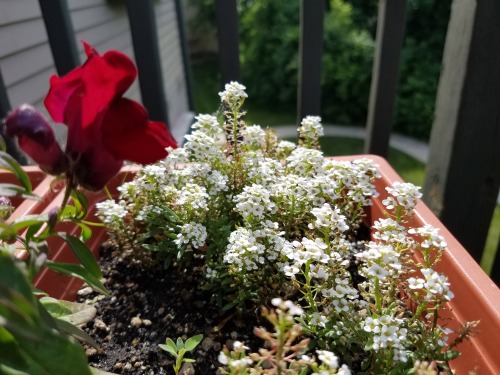
I planted some flowers on my balcony this spring. While looking online for tips on plant care, I learned about the concept of deadheading which is when a gardener trims off stems/flowers that are starting to wilt. As I understand it, this stops the plant from trying to maintain dying flowers so it won’t spread its resources too thin. To be honest though, I usually don’t do this very consistently because 1) I’m lazy and 2) I feel like I’m hurting the plant.
It hasn’t been an easy season. I think I’ve doubted God more than I can remember doing so ever before. And one of the questions at the center of my tumult has been how I should think about God’s purposes and involvement in certain past events. It’s the classic problem of evil in its specific form. I know that the are tons of answers to the theoretical problem of evil, but those answers don’t help me make sense of how to interpret God’s intent in the specific things that have happened. So although I remain fairly certain that he’s there, it sure feels like I can’t reliably interpret what he’s going to do, and I don’t have a phone number I can call to hear him explain.
Why is not being able to have an explanation such a roadblock for me right now? As I’ve been thinking about it, I think it comes from the way I’ve viewed God and the way I interpret certain verses in the Bible. Those in the reformed camp, who love John Piper and all the rest, lean hard on Romans 8:28 during hard times- All things work together for good for those who love him. When we encounter trials, we labor to assume it is meant for our good, not for our destruction. And the way that comes out is that we always try and find the good side of something, or something we learned, or the direct or indirect benefits of what happened.
When we do this, what we are implicitly trying to do is to show that a perceived bad event was actually a net gain. Sure, what happened was bad, but good things came out of it as well, and the good outweighs the bad so overall this was a good thing so PTL. But this kind of calculus is completely inappropriate for some situations. For example, I heard a story of a couple who lost a child in a miscarriage; how is it at all ok to try and point out all the “beneficial side effects” and try and stack them up against the life of that kid? What about someone who was abused? In that case I think trying to weigh the pros and cons at all is utterly callous. When the hurt is great enough, a cost-benefit analysis loses its explanatory power and becomes actively unhelpful.
I think that as Christians we cannot believe that “All things work together for good” means that each individual event that happens, taken by itself, will have a net positive effect on my life. I think we need to have a more nuanced view that allows us to be honest in calling something bad when it really is bad, while still having hope that in context of future events, this will have been a necessary step that God in his wisdom made us go through. This is kind of where I have settled- I must honestly say that some things that have happened are mostly negative, and that if there are good things to come, I haven’t seen that yet. But I need to fight to believe that good will prevail in the end.
Because let’s be honest, deadheading a plant doesn’t make it prettier, and you could argue it’s hurting the plant. But it’s a necessary step for it to turn into something beautiful.
 themonthswillpass liked this
themonthswillpass liked this  themonthswillpass reblogged this from mrsaturn101
themonthswillpass reblogged this from mrsaturn101  shienaminteost liked this
shienaminteost liked this lawrenceyong liked this
daretodream-big liked this
 jkjli liked this
jkjli liked this lamiraj liked this
eunicehparkk liked this
runningtohim liked this
mrsaturn101 posted this